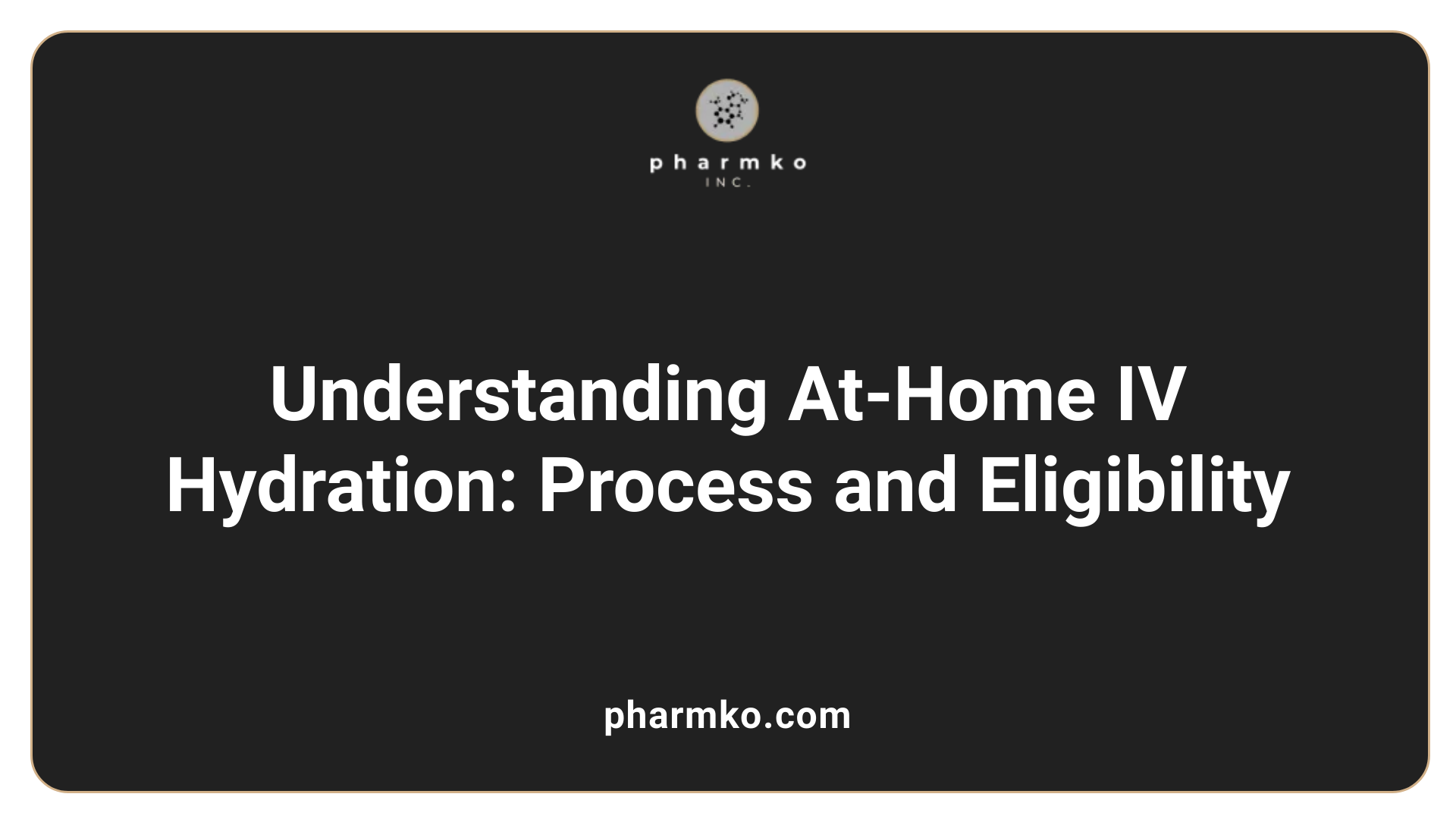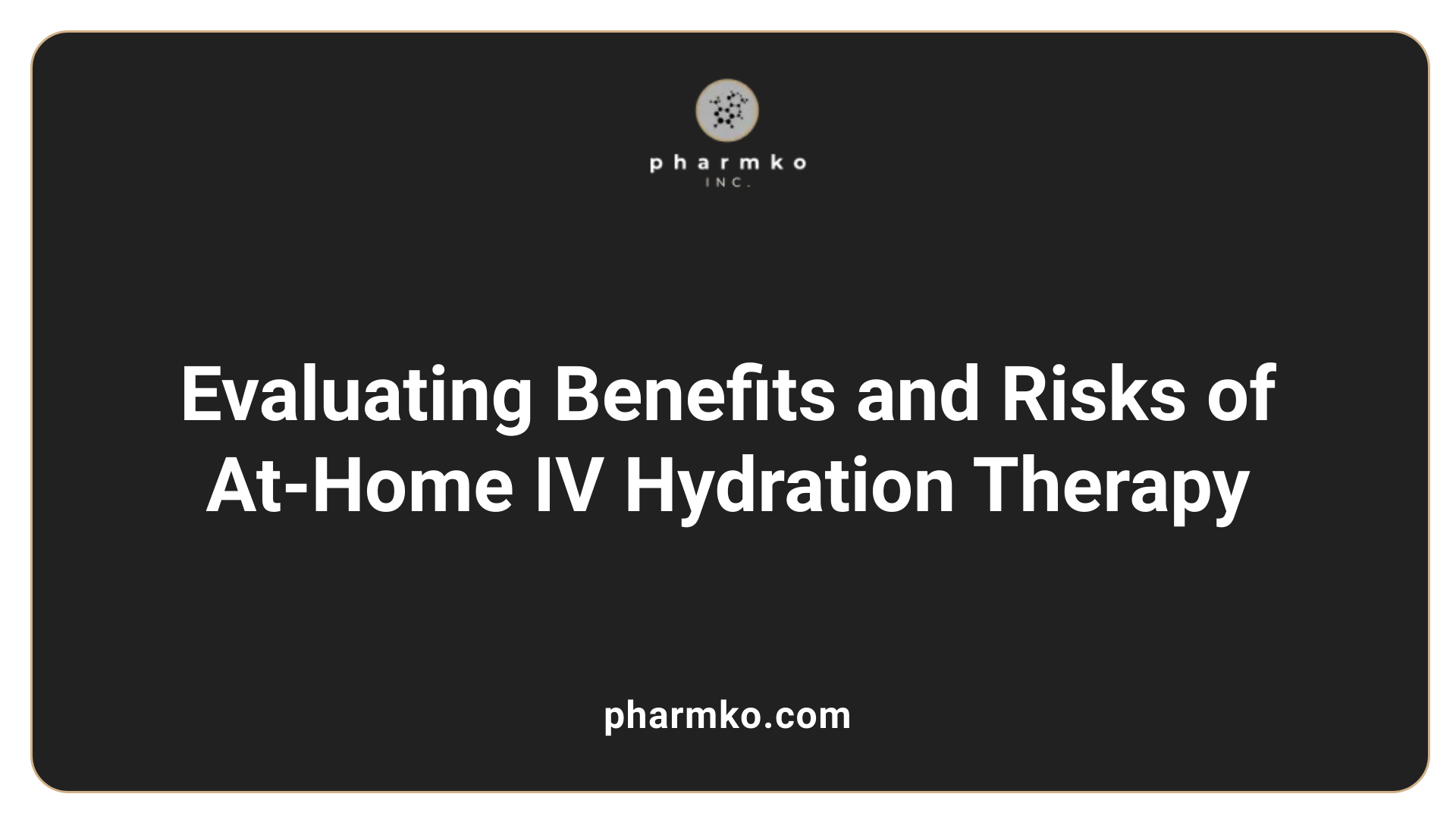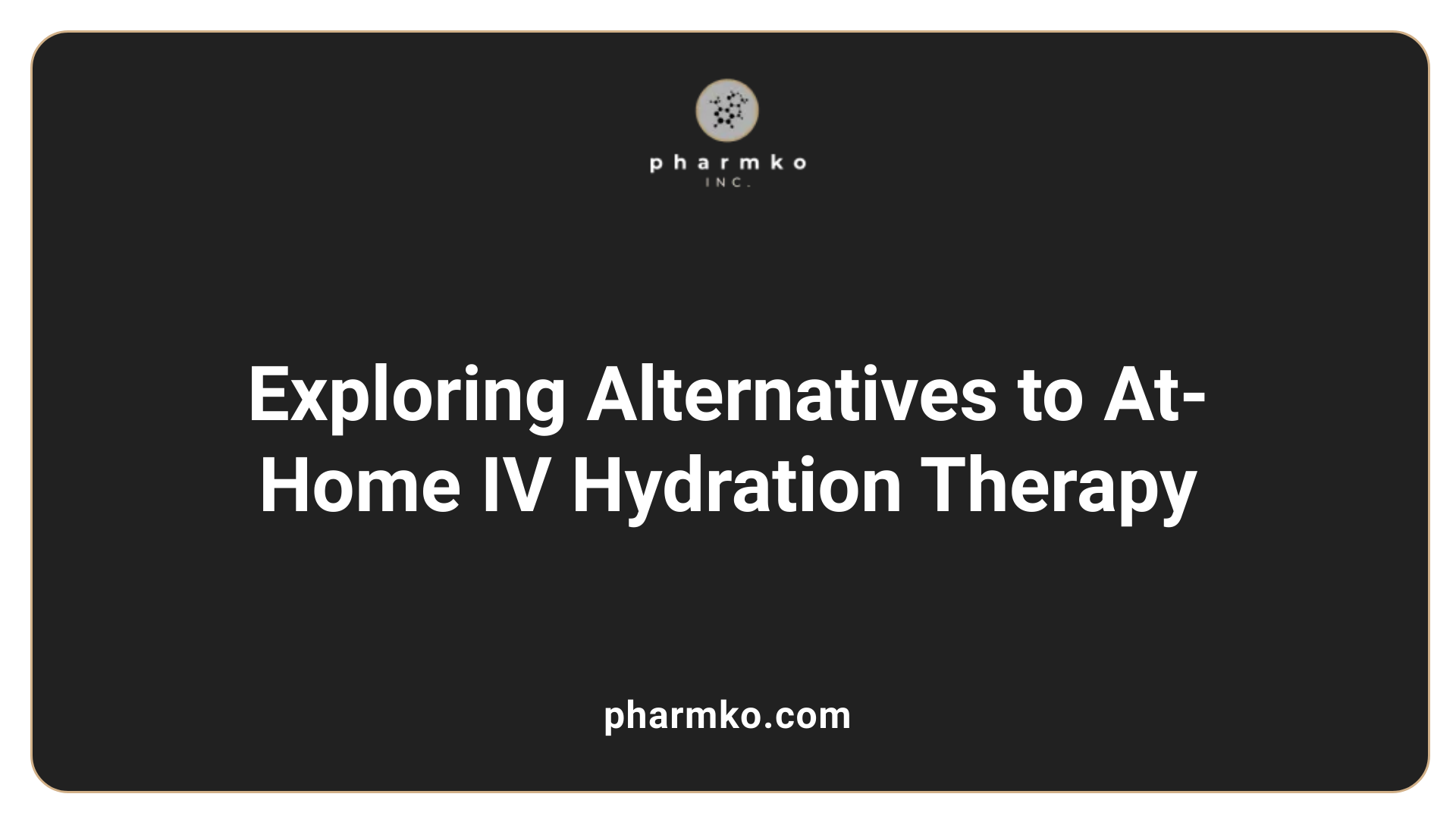At-home IV hydration for health
At-home IV hydration therapy has emerged as a popular trend for those seeking rapid rehydration and wellness enhancement outside clinical settings. With increased interest spurred by convenience, celebrity endorsements, and claims of boosting energy and relieving hangovers, it's crucial to explore the factual benefits, necessary medical oversight, and potential risks associated with this practice.
How At-Home IV Hydration Works and Eligibility Criteria

Description of the therapy process
At-home hydration therapy involves administering IV fluids as prescribed by a physician to manage hydration needs in patients unable to maintain fluid balance through oral intake alone. This process typically starts with a recommended transition from hospital care to home settings, involving the coordination among healthcare professionals. Patients receive IV infusions at home that may consist of hydration solutions or essential nutrients, facilitating their recovery and overall health.
Medical assessments for determining eligibility
To qualify for at-home IV hydration, a healthcare provider must evaluate each patient based on medical history and current health status. Factors influencing eligibility include conditions such as severe dehydration due to illness, side effects from cancer treatments, or complications like Hyperemesis Gravidarum during pregnancy. For patients receiving total parenteral nutrition (TPN), home IV therapy is crucial for ensuring adequate nutrient intake and hydration.
Role of healthcare providers in the administration
A dedicated team, including clinical pharmacists, specialized nurses, and IV technicians, administers at-home hydration therapies. These professionals provide training and education to ensure patients or caregivers can administer IV fluids safely. Monitoring for potential complications is essential, with patients advised to look for signs like swelling around the IV site or skin integrity issues.
Can a doctor prescribe IV fluids at home and what are the implications for patient safety?
Yes, a doctor can prescribe IV fluids for home administration under specific conditions. This approach allows patients to receive necessary hydration in a comfortable setting, reducing hospital visits and related infection risks. However, patient safety remains paramount; a sterile environment for administration is vital. Continuous monitoring ensures any complications are addressed promptly. Education for patients about the risks, such as infection or allergic reactions, equips them with the knowledge to seek help when needed.
Benefits and Risks: Evaluating At-Home IV Hydration

What are the benefits of at-home IV hydration therapy?
At-home IV hydration therapy can be invaluable for certain patients who require prompt fluid replacement. It allows for rapid rehydration, especially for those suffering from conditions requiring total parenteral nutrition (TPN), chemotherapy-related nausea, or severe diarrhea. This method delivers fluids and nutrients directly into the bloodstream, facilitating quicker absorption and support for recovery.
The home infusion team is composed of skilled professionals, including clinical pharmacists and specialized nurses. This collaborative approach ensures patient-centric care tailored to individual needs, promoting comfort and convenience by allowing patients to receive treatment in the familiarity of their own homes.
What are the risks of at-home IV hydration therapy?
However, the use of at-home IV hydration carries substantial risks. Potential complications, such as infections, blood clots, and the possibility of nutrient overdoses, necessitate careful monitoring. These risks are amplified for those with pre-existing health conditions or those receiving complex treatments.
Moreover, the value of IV hydration in non-medical contexts—such as treating hangovers or jet lag—raises questions about necessity. Many people can maintain adequate hydration through oral intake, making the reliance on IV therapy for mild conditions dubious. Notably, while some celebrities advocate for 'drip bars', the scientific evidence does not universally support their effectiveness for non-clinical issues. Therefore, while IV hydration therapy can be beneficial in specific medical circumstances, its routine usage outside a clinical setting may not always be justified.
| Aspect | Benefits | Risks |
|---|---|---|
| Rapid Rehydration | Quick delivery of fluids and nutrients | Potential infections and blood clots at the IV site |
| Professional Support | Skilled team ensures tailored care | Monitoring required to prevent nutrient overdoses |
| Home Comfort | Treatment in a familiar environment | Necessity for healthy adults is questionable; primarily oral hydration |
| Convenience | Reduces trips to clinics or hospitals | Claims of effectiveness for mild issues lack strong scientific backing |
Alternatives to Consider: Beyond IV Hydration

What are the alternatives to at-home IV hydration therapy?
At-home IV hydration therapy is not the only solution for maintaining proper fluid balance. Several alternatives offer effective ways to enhance hydration without invasive procedures.
-
Dietary Changes : A whole food diet that emphasizes hydration can significantly support health. Incorporating a variety of fruits, vegetables, and lean proteins provides essential nutrients that contribute to hydration. Foods like watermelon, cucumbers, and oranges have high water content, making them excellent options.
-
Nutritional Supplements : For individuals who may struggle with oral intake or specific nutrient deficiencies, supplements can be helpful. Electrolyte drinks or powdered supplements can replenish fluids and minerals, assisting in hydration without the complexity of IV therapy.
-
Juices and Smoothies : Fresh cold-pressed juices and smoothies pack a nutrient-dense punch. These beverages not only hydrate but also provide a concentrated source of vitamins and minerals, echoing some of the benefits of IV therapy.
-
Hypodermoclysis : This less invasive method involves injecting fluids subcutaneously, making it suitable for older adults or those who may require slower fluid replacement. It is particularly beneficial for patients who cannot tolerate IV therapy.
-
Sunlight for Vitamin D : Regular exposure to sunlight aids the body in synthesizing vitamin D, crucial for immune support. This can indirectly enhance overall health, potentially reducing the need for fluid replacement due to enhanced well-being.
| Alternative Method | Description | Suitable Population |
|---|---|---|
| Dietary Changes | Whole foods rich in water and nutrients | General population |
| Nutritional Supplements | Electrolytes and vitamins in a convenient form | Individuals with deficiencies |
| Juices and Smoothies | Nutrient-dense, hydrating beverages | Anyone seeking hydration without fluids |
| Hypodermoclysis | Subcutaneous hydration, less invasive than IV | Older adults, certain patients |
| Sunlight for Vitamin D | Natural vitamin D synthesis | General population |
Each of these alternatives offers distinct benefits and can be tailored to individual needs, providing hydration solutions that are effective and less invasive.
Cost Considerations and Service Provider Comparisons

What are the costs associated with getting an IV drip at home?
The costs associated with at-home IV therapy can vary significantly based on the chosen service and package. Generally, patients can expect to pay anywhere from around $110 to $625 .
- Hydration Package : Starts at $199
- NAD+ Package : This more specialized treatment begins at $749
In addition to the package costs, there is typically a standard home visit fee of $229 . This fee includes a consultation and the provision of 500 ml of IV fluids . For those looking for added nutritional benefits, additional vitamin add-ins can be included at a cost of $20 each . This means that the overall expense can escalate based on the specific selections and enhancements made by the patient.
Variability in service provider offerings
Different service providers may have varying approaches and packages for at-home hydration therapy. Some may focus solely on hydration, while others include more specialized services like administering antibiotics or medications for hormone deficiencies.
Comparison Table of Home IV Therapy Costs
| Service Provider | Basic Hydration Package | Specialized Packages | Home Visit Fee | Add-Ons |
|---|---|---|---|---|
| Provider A | $199 | $749 | $229 | $20 |
| Provider B | $150 | $800 | $250 | $15 |
| Provider C | $180 | $600 | $200 | $25 |
As seen in the table, costs can differ widely among providers, making it essential for patients to compare offerings before deciding which service best suits their needs.
Understanding the Role of Medical Professionals in Home IV Therapy

Roles and expertise in home IV services
At-home intravenous (IV) therapy involves a dedicated team of medical professionals who play a critical role in delivering effective care. This team typically includes clinical pharmacists, specialized nurses, dietitians, and IV technicians. Each member brings distinct expertise that ensures comprehensive and tailored treatment for patients.
- Clinical pharmacists manage medication interactions and optimize treatment plans.
- Specialized nurses administer IV fluids and monitor patients for any complications.
- Dietitians help plan nutrition for those on total parenteral nutrition (TPN).
- IV technicians assist in setting up and maintaining the IV administration apparatus.
These professionals work together to coordinate the transition from hospital to home swiftly, ensuring patients can maintain hydration and health with minimal disruption to their routines.
Patient education and safety protocols
Patient self-management is essential in home IV therapy. Nurses educate patients and their families on administering IV medication, highlighting safety protocols to monitor for potential complications.
Awareness of signs such as swelling, skin integrity issues, or any adverse drug reactions is crucial. This empowerment helps patients remain independent while managing their health effectively.
In response to the question, "Can home health do IV fluids?" , the answer is yes. Home health services can provide IV fluids, which includes not only hydration but also antibiotics and chemotherapy, all from the patient's home. Proper coordination with healthcare providers and education on self-care are key components of successful home IV therapy.
Final Thoughts on At-Home IV Hydration
While at-home IV hydration offers the allure of convenient wellness benefits, it is not a one-size-fits-all solution. Understanding the medical necessity, related costs, and potential risks is crucial for potential users. Those considering this service should engage with qualified healthcare providers to ensure appropriate applications, emphasizing safer, more effective alternatives where possible.
References
- Hydration Therapy at Home | Advocate Health Care
- Drip bar: Should you get an IV on demand? - Harvard Health
- IV treatment at home: MedlinePlus Medical Encyclopedia
- Home Infusion Therapy - Aurora Health Care
- Home Care, Home Infusion, and Durable Medical Equipment
- Practical Concerns | OncoLink
- Managing Practical, Emotional and Development Concerns | OncoLink
- Practical Needs | OncoLink
- Managing Practical and Emotional Concerns | OncoLink
- Does IV Vitamin Therapy Work? - Cedars-Sinai













